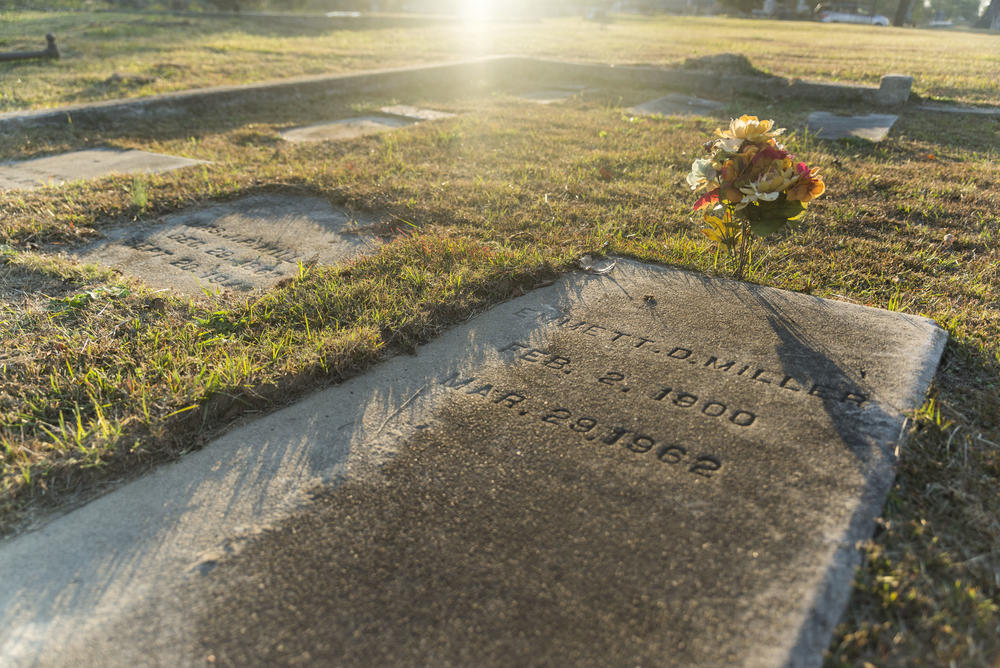Section Branding
Header Content
The Minstrel Show Roots Of Country Music's Blue Yodel
Primary Content
A Piece Of Macon Music History To Reckon With
Odds are good you have never heard of Emmett Miller. Not too long ago, neither had Ben Arthur.
Arthur produces a PBS show called “Songcraft Presents.” In the show, he and another songwriter explore some piece of music history, then write a song about it. For a show in Macon, Arthur teamed up with Americana musician and scholar Dom Flemons, founding member of the Grammy-winning Carolina Chocolate Drops. So Arthur asked Flemons, what’s interesting in Macon?
“He said ‘Have you ever heard of Emmett Miller?’” Arthur said recently on the stage of the Grand Opera House in Macon. “And I had to admit, no.”
So who was Emmett Miller? He was an early voice in popular music hailing from Macon decades before the names you already know, like Little Richard, Otis Redding and The Allman Brothers Band. Unlike those names, though, his life is one perhaps better reckoned with than celebrated.
One listen to Emmett Miller’s 1927 recording of the song “Lovesick Blues” shows you what was special about him. There you hear the yips, howls and breaks that led newspaper writers of his day to say he had a “trick voice”. Many fans of country music may recognize the song as a Hank Williams tune, which it was, about 20 years after Emmett Miller’s recording. Hank’s hounddog yodel in that tune? Miller did it first.
Today that break it signals sincerity, emotional depth – soul. As far as anyone can tell, Emmett Miller agreed with the papers that it was just a good trick.
As a kid born to textile worker parents in Macon, Miller dreamt of hitting the road like the showmen he saw at Macon’s Grand Opera House. He performed there at the age of 12 and then later in the 1920s during his brief heyday. That’s why Arthur and Flemons picked one of the Grand’s glittering box seats to start writing their song together.
Dom Flemons came with a riff and a lyric, a rollicking finger picked thing about “those Good Old Days...” He wants a song you’ll be stuck singing all day, but there’s a challenge:
“Because with all this stuff that’s been happening recently...” he told Arthur.
“When you say all this stuff, do you mean Charlottesville?” Arthur asked.
Yes, Charlottesville. And mass shootings, too. So what does any of that have to do with Emmett Miller?
Look around YouTube for a film called “Yes Sir, Mr. Bones” from 1951. You’ll find a pair of clips featuring Emmett Miller performing as he had done since he was a young man, in blackface.
Young Emmett Miller’s heroes? They were blackface minstrels. And he was one too. One of the film clips of a road-worn comedy routine is cringeworthy, out of bounds by today’s standards. But near the end Miller’s voice flies.
“You can't listen to the music and pretend there's no value there,” Ben Arthur said.
Dom Flemons filled in the backstory for that music.
“It was always for nostalgia,” he said. “At first it was trying to depict plantation negroes.”
From the start blackface and minstrelsy were about a fake nostalgia based on white Northerners fantasies of the South. White performers first started performing in blackface in 1840s New York. Stephen Foster, writer of “Camptown Races” “Oh, Susanna”, “Old Folks at Home” and dozens of other songs that you've heard all your life? He wrote for the minstrel shows. He never laid eyes on the Suwanee River.
Even early on there were critics. Frederick Douglass in 1848 described minstrels as ”the filthy scum of white society, who have stolen from us a complexion denied to them by nature...” He was no more fond of African-American performers who wore black face.
Even so, Dom Flemons said minstrel music holds an important distinction.
“It was the first popular music that was uniquely called American music,” he said.
Blues, bluegrass, country, jazz, ultimately rock, they all have their roots in minstrelsy. Still, it looks like it was explicitly minstrelsy Miller loved. He stuck with it after some of his contemporaries, like Jimmie Rodgers, traded blackface for cowboy hats. A few of his old buddies even later landed on the “Grand Ole Opry.” Ben Arthur said pop culture’s fascination with playing pretend didn’t stop with the minstrel circuit.
“You know, Tom Waits is not a homeless hobo,” he said. “Costuming and pretending to be something we're not, something that we find fascinating, is here to this day.”
Emmett Miller never traded costumes, even when the times had changed. That’s at the heart of Dom and Ben’s song.
https://www.youtube.com/watch?v=pBd0JorCQQo
“Your lips was red and your eyes was wild, you think ol’ Jack Johnson taught you how to smile,” Dom Flemon sings in the recording. “But when the mask is broken the shards is on the floor...”
Then Flemons takes a shot at the trick voice.
“In those good old days...”
Miller died, largely forgotten, in 1962, about a decade after his last shot at a comeback that never came. When I found his grave in a neglected cemetery in Macon, it had been recently cleaned and left with a bouquet of fake flowers.
The Emmett Miller episode of Ben Arthur’s PBS show “Songcraft Presents” will be ready for air in January.


